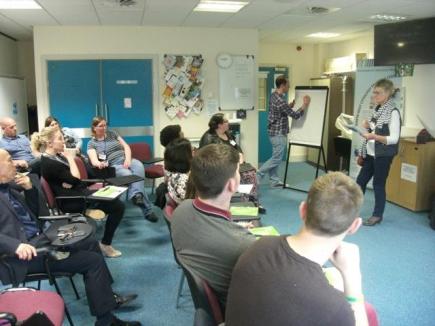Meeting victims of life-threatening conditions is rarely, if ever, a cause for optimism.
But in the National Meningitis Reference Laboratories of Manchester Royal Infirmary there is something of a pioneering breakthrough underway.
Meningitis is one of those diseases that everybody has heard of but has arguably slipped under the radar as the majority of fatalities come down to people simply not recognising the symptoms.
Like many other mortality-inducing conditions, meningitis and its various strains do not just cause grief and pain for sufferers and families in the treatment phase – the after-effects can reverberate for years, and in some cases, decades.
People have to contend with the usual human emotions of guilt and helplessness, but then deal with the havoc that the disease can have on their loved ones physically, with limb amputations and loss of eyesight some of the more common outcomes.
That is where the Meningitis Research Foundation (MRF) comes in – a charity that both supports victims and their families through the often long recovery and raises money towards meningitis research.
The MRF’s latest scheme was to organise a cross-Pennines walk comprised of members and charity employees, which began in Sheffield on May 23 and covered 100km over mountainous terrain before ending in Glossop six days later.
The Trans-Pennine Challenge’s first objective was to raise money for developing the MRF’s genome library – a database centred in the Manchester Royal Infirmary that houses the reference codes for thousands of different meningitis strains.
The importance of this is that the patient samples can be accessed by anyone in the world i.e. a doctor in New York has the same information at his disposal as the doctor in England who submitted the sample – a benefit emphasised by consultant clinical scientist, Ray Borrow.
“The library is a world first,” he said.
“Every bug of that pathogen has been genome sequenced for the entire year. It’s a massive step forward.
“It’s a bit like going to a library for a collection of books – everyone, even public, doctors in America, can access it. Manchester is a leader in meningitis research.”
While Ray is clearly proud of the development, public awareness of meningitis is relatively low when compared to HIV or cancer, and a lack of funding means that just over 50 staff are processing almost 100% of UK meningitis samples – around 16,000 in total.

PIONEERING RESEARCH: Manchester Royal Infirmary is providing a genome library that will be accessible throughout the world
That is where the MRF comes in, and following the Trans-Pennine Challenge the charity has arranged a tour of the genome library so its members can see how the money they raise is being used to combat the disease.
Among the party is nine-year-old Sofia Crockatt, who contracted meningococcal septicaemia in 2007.
Despite losing a leg during her fight with the disease, Sofia recovered to become a standard-bearer for other victims.
Having just completed two kilometres in Manchester’s City Games the week before and taken part in the Mini-Great North Run in 2013, Sofia’s refusal to let her disability curb her enthusiasm has earned her the accolade of being the MRF’s first ever Junior Ambassador, and last year she raised £10,000 for the charity.
All that work had left Sofia too tired to talk, with her nodding off during a genome library session being one of the funnier parts of the day, but her mum Karen is eager to praise the support the family have received over the last seven years.
“They [MRF] have been looking after us for seven years now,” she said.
“They’re like our second family. They’re really wonderful people and they really care.
“Today has been great. It’s good because everyone has got together but it’s also good to see the genome library, which is really impressive. She [Sofia] wanted to see the bug that caused her disease, so she thought that was great.”
One of the aspects that contribute to the disease’s mortality rate is the surprising speed with which it takes hold, often leaving the situation too far gone before people even realise what is happening, as Karen describes.
“It was a very rapid onset,” she said.
“Sofia started with a cold, but hadn’t been particularly poorly the night before. I went in to check her the next morning and she was a bit tired but fine. My husband went in ten minutes after I’d been in there and she was unconscious.”
Her parents rushed Sofia to casualty, fearing the worst.
“We waited four days for them [casualty] to tell us,” said Karen.
“We’d already said our goodbyes and we didn’t think she was going to come out of it. Then she started to come out it but that’s when they transferred her to Booth Hall [Children’s Hospital] and they told us she would have to lose her leg.”
Her ambassadorial role keeps Sofia much busier than the average nine-year-old, with school presentations and charity fundraisers just a few of her commitments, and this year she hopes to raise another £10,000.
Though, while there is plenty of good that has come since her battle with meningitis, the long-term effects still surface from time to time.
“She has flashbacks sometimes which can be quite upsetting” Karen admitted.
“The other day some music came on and she said ‘turn it off mummy, turn it off, turn it off, you used to play this when I was ill’.”
In spite of these difficulties, the Crockatt family remains optimistic in that it could have been worse.
“The advantage is that she was so young that now she’s lived more of her life without that leg than she did with it,” said Karen.
“It’s still traumatic going through it, but we’re extremely lucky – a lot of parents have lost their children.”
That is where the importance of charities such as the MRF comes into play – helping victims come to terms with the often uneven hands that life deals them.
And even after seven years, Karen is still unsure where the whole experience sits with her in retrospect.
“You look and think ‘would I turn back the clock?’” she said.
“Of course you would. No parent should have to see their child go through it. But would she have achieved what she’s achieved now? I don’t know.”
Visit their website here.



